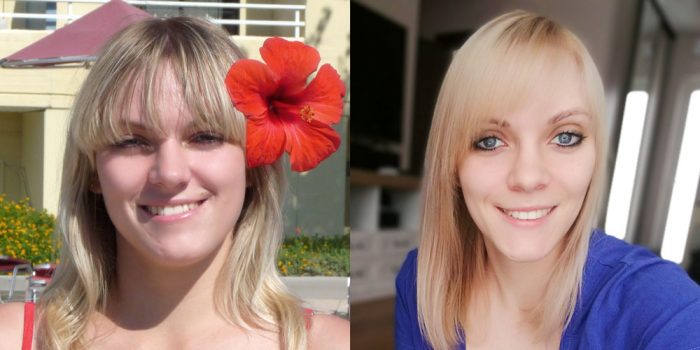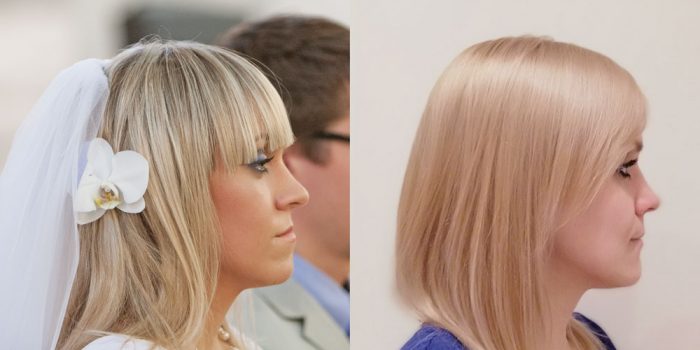What was your life like before the surgery? What troubles were you experiencing because of malocclusion and jaw position? In what way, if at all, have you tried to handle this problem by yourself?
I heard the fact that I might need a surgical treatment quite early, back in my teens, but at that time, such surgeries were a novelty in Lithuania, so this idea was dropped. I think malocclusion, which changed the appearance, was most visible, at least to most of the girls. Later, more severe problems occurred: jaw cracking, pain, wearing of teeth, enamel fissures, and even migraine headaches. At that time, I got prescribed treatment with dental plates. However, no one emphasized enough neither to my parents nor to me, how important it is to wear them, so the plate would be often left there to lie on the bedside table… On the other hand, the plate could have never solved the problems of the jaw.
Where did you learn about this treatment method, and who encouraged you to choose precisely this method?
I started seriously considering orthognathic treatment when my teeth began wearing down when enamel fissures occurred, plus the pain in the joint… Also, when orthodontists warned me that after 8-10 years, I’d need reconstruction of teeth, and in old age, it even could be problematic to install dentures. In total, I turned to three orthodontists, and I heard the same verdict from all of them – a surgery is necessary. Then I ultimately decided to take on this road.
Have you considered some other alternatives?
Since there were no other alternatives in my case, making a decision was relatively simple.
Did you look up other people’s experiences and opinions before you chose orthognathic surgery?
I became interested in stories of success/failure of others, only being halfway in my treatment. Since I work in the field of medicine, I was very much interested in the technical side. So, I watched a few video recordings of surgeries, read scientific articles with statistical surveys, and other materials.
Were you in need of support from relatives or friends? What was their reaction like when they learned that you’ve decided to have surgery?
Reactions of those close to me were different. Part of them was supportive, but most of them asked what for am am I doing it? According to an old Lithuanian saying, for an owl, her kids look the prettiest. Most of the older-age family men emphasized that narcosis will do tremendous damage to health. Still, I firmly knew that contemporary anesthesia is very advanced, and I was right about it. I feel no consequences. Besides, I’m a person of strong opinions and solve every matter by myself.
How did the treatment process go? What moments were the most difficult? Most comforting?
The period before the surgery seemed to be endless. The most difficult moments were during the final stages of the orthodontic treatment when my appearance looked even worse than at the beginning of treatment because the malocclusion of the mandible was extremely visible. It influenced speaking, and back then, all exams at the university were oral. On the other hand, the day when I got into the hospital ward as the most comforting.
In your opinion, what is critically important when deciding and choosing orthognathic treatment? What would you advise other people who encounter a similar situation?
First, I’d recommend assessing if there are any other treatment alternatives and see if the occurring problem is a health disorder. It is precisely the health, and not the changes of appearance should be the main argument when choosing to have surgery. Both the road leading to the surgery and the first few months afterward give you a hard time, so one must be strong. Undoubtedly, it is necessary to assess one’s financial possibilities too because the preparatory treatment is also an essential and long-lasting part of the treatment, equal to surgery.
How did your life change after the treatment?
ow I walk with my head high; I no longer hide behind high necks of sweaters or scarfs. I’m still shy of the camera. I used to avoid it all the time, so I continue doing so to this day. Perhaps I don’t particularly appreciate being photographed, and that’s it. The surgery and preparation for it also gave me my vocation – in my study years, I discovered my professional orientation and current specialization in veterinary dentistry.
If you could turn back time, already knowing and experiencing as much as you have now, would you still choose to have orthognathic treatment?
If I could turn back time, I would still choose such an experience because it was a great life experience. I learned directly how far advanced medicine is. This period of life is dear to me to this day, and I still keep my hospital bracelet and surgical gown.





